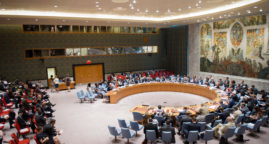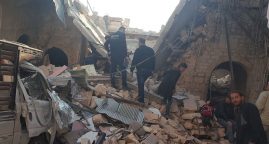Syria’s civil war – Another grim anniversary after 7 years
Article published on The Sovereign Oder of Malta website on 03/09/2018
After seven years, the unabated violence of the Syrian civil war continues to cause monumental suffering for millions of civilians in the Middle East.
“The desperate situation in Eastern Ghouta is a horrible and predictable recurrence of the states of siege in towns like Homs and Aleppo,” says Janine Lietmeyer, Country Group Manager for Syria and Lebanon at Malteser International, the Order of Malta’s worldwide Relief Agency. “In Idlib, 300,000 newly displaced persons have become heavily dependent on humanitarian assistance. Syrian aid workers who have been risking their lives for the past seven years as doctors, nurses and midwives, are now in a state of total exhaustion. They are deserving of our full solidarity and support.”
However, the precarious situation and unstable security are not the only problems facing humanitarian work in the country.
According to Lietmeyer, aid workers in the country have been accused of losing their neutrality. “The confusing mix of parties involved in the conflict and their continued violations of international humanitarian law may be understandable reasons to think all actors within Syria are politically corrupt. Access to areas with people in need can only be gained through negotiations with warring parties in control. For humanitarian aid actors, the core mission is to bring help to millions of civilians who have been dependent on aid since the start of the war.”
There are hardly any more superlatives left to express the tragic dimensions of the Syrian civil war. It has been described as the conflict with the largest flow of refugees, the most intensive bombardments of civil institutions, the most brutal war crimes, and the highest number of failed UN resolutions.
Malteser International has been active in Syria since 2013, providing medical care and life-saving aid for displaced persons in partnership with Syrian local organizations. Malteser International’s work in the country includes support for three basic healthcare facilities, a mobile clinic, as well as a maternity and pediatric clinic. Funded by the German Foreign Office, it now plans to expand its aid in western Aleppo and Idlib. Basic goods packages will be distributed to around 440,000 people in the coming weeks.
.
Related Articles
Dialogue and confidence vital to prevent, resolve conflicts, says UN chief
In cases involving weapons of mass destruction, “verifiable disarmament and non-proliferation” efforts are critical, stressed the UN chief
Vote on a Resolution Recommending António Guterres as the Next Secretary-General
10/05/2016. António Guterres had been the only candidate with more than nine “encourage” votes and received no red ballot as a “discourage” vote.
Peace in Syria an imperative ‘that cannot wait’ UN chief Guterres says as war enters seventh year
03/15/2017. As the brutal war in Syria enters its seventh year, peace “is a moral and political imperative both for the Syrian people and for the world,” António Guterres.






